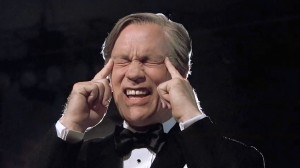Have you heard of this movie? One of Malkovich’s recent low-budget choices that seem not to get much pre-video-release attention despite his always great performances therein. This one stars Tom Hanks’s son as a guy who decides for no clear reason (he was unhappy; I guess it’s enough) to leave law school and get a job as a road manager for a washed-up mentalist.

Buck Howard is a great character. Malkovich gives him a shoulder-joint-busting handshake that’s funny every time. And so the movie should be great but it’s not even that good. I couldn’t figure out what was keeping me from falling in love with it until the end. All throughout the movie, Colin Hanks’s character has been letting us know not just what’s going on, but what his character thinks about what’s going on through a cinematic technique I want to spend the rest of this blog post um, interrogating: the voice-over.
It’s been many years since I was last in a film studies class, but from what I can recall the voiceover found its heyday back in Hollywood noir (so many adaptations of novels), and then like wasn’t it the one thing the French New Wavers refused to steal from Hollywood noir? Because it was literary and not cinematic? (Though right now I’m starting to recall a really great voiceover used in Godard’s Alphaville…we’ll all have to wait for Chris Higgs to fill us all in on the truth.)
While I’ve never been one to submit fully to the interests of the New Wave and their Dogme 95 stepchildren, who seek a similar purity, this is one but of dogma I have to get on the side of. The voiceover is too literary, and always comes across to me as a cheat, the cinematic equivalent of dropping a film-still onto a novel page rather than resort to having to describe a hero’s face. Changes in a character’s mindset or attitude are nigh on impossible to depict filmically, and this definitely includes rendering an epiphany, but rather than find a way for a visual to carry the required information, writer/director Sean McGinly opts for voiceover, and a poorly written voiceover at that. “And for the first time,” C. Hanks’s character says right at the end, “I realized, that etc. etc. etc.”
It’s an easy lesson to learn, I think. Cinema or literature: if you find your characters verbally pronouncing that for the first time they are learning something connected even tangentially to your film’s theme, certain audience members are going to be very angry at you for ringing such loud alarms in their ears.
I’m sure some of you can come up with good uses of voiceovers in movies (and I’ll imagine you’ll cite Goodfellas but I don’t think I’d agree), but I can’t think of any right now so I’ll just like curmudgeonly pronounce they are never good ever.
I am, of course, with you on 99% of the uses of voiceover in movies, but it can be done. The last time I remember it being sort of great was in In Bruges. I hesitate to say that because I can’t remember the voiceover in the rest of the movie, but it really kills in the final scene almost solely because it’s just straight telling us something realized.
Granted, the character could just as easily say or even do something in this case to make his revelation clear, but it seems like information that needs to be confessed rather than demonstrated. Like, the character wouldn’t say it out loud even if he had someone to say it too, I suppose.
Agreed, especially on first person voice over narration. But third person narration, done sparingly like Alec Baldwin in The Royal Tenenbaums, is OK I guess. Actually, wasn’t Wes Anderson consciously trying to invoke the sensation you get while listening to your inner narrator while reading a book? It is supposed to feel like reading a Salinger story, or a New Yorker profile of the Tenenbaums, or something like that. Maybe it’s still a little cheesy.
A related example is Arrested Development. What I like about the voice over in AD is that they use it to efficiently set up scenes and premises, which allows them to pack a huge number of laughs into each 22 minute episode.
On the subject of detective noir movies, I was thinking back to some of my favorites, like The Big Sleep, Chinatown, and Altman’s The Long Goodbye, and I don’t remember any of them having voice overs. I have in my mind that noir detective films are notorious for first person voice overs, but now I can’t even think of any examples.
Hmm. A Christmas Story, I’m afraid I have to admit I kind of like that first person voice over.
On the other hand, the all time worst first person voice over has got to be on The Wonder Years.
Absolutely Wonder Years, exactly because it’s there for pronouncing the epiphany as the camera zooms slowly in on little Kevin’s open, heartbroke, disillusionment-right-before-our-very-eyes face. And yer also right about Arrested Development (again…yer getting to be this blog’s AD champion) which of course works because of its 3rd-person omniscient POV.
I’m afraid I have to admit I kind of hate the voiceover in A Christmas Story. It’s so hammy.